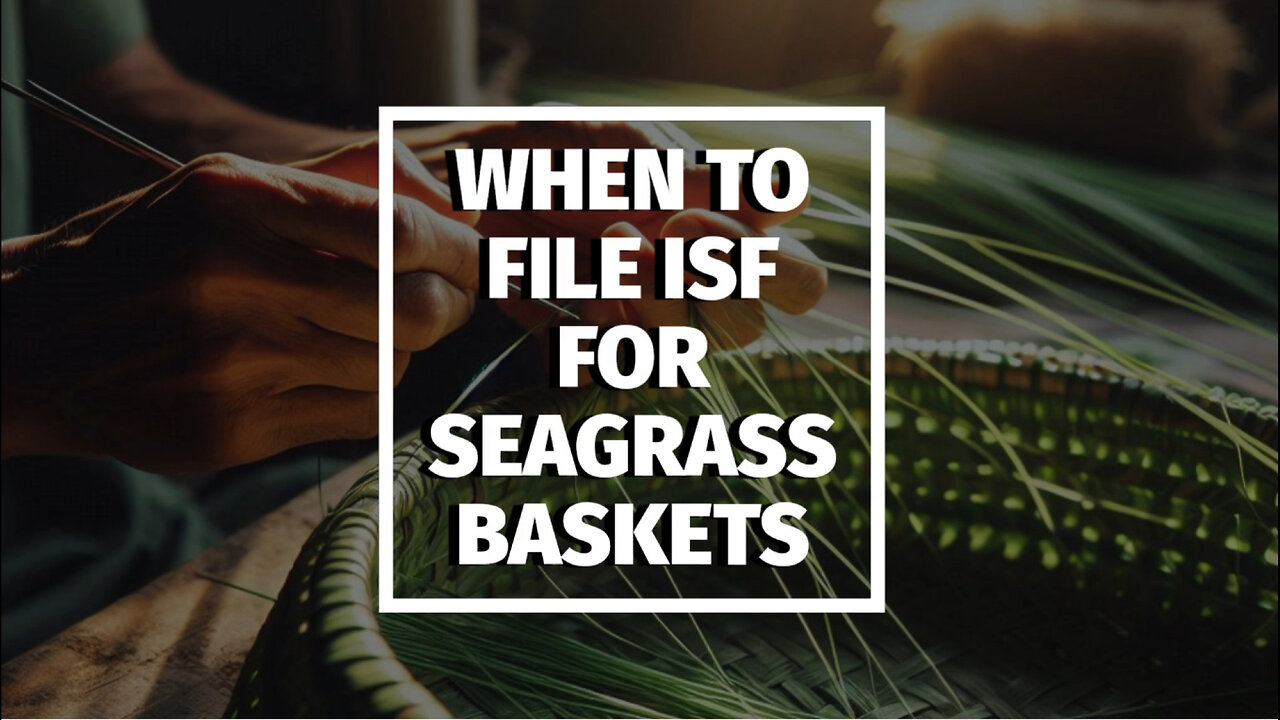Premium Only Content

** Mastering ISF: Essential Tips for Importing Seagrass Baskets **
* e-Customs Clearing
* 714-855-3556
* info@eCustomsClearing.com
* https://ecustomsclearing.com
SUBSCRIBE → https://www.youtube.com/channel/UCUwQ3bbxUUhIxDkV304ipNQ?sub_confirmation=1
The Importer Security Filing (ISF) is a critical requirement by US Customs and Border Protection (CBP) that enhances the security of cargo entering the United States by collecting data before the shipment's arrival to assess potential risks. Specific items like seagrass baskets have unique import patterns that require careful attention during ISF filing. ISF must be submitted at least 24 hours before the vessel's departure to avoid penalties, cargo confiscation, and shipment delays. Proper classification using Harmonized Tariff Schedule (HTS) codes for seagrass baskets is crucial to prevent additional duty fees or customs clearance issues. Detailed data elements such as importer of record number, consignee information, and goods description are essential during ISF preparation for seagrass baskets to facilitate a smooth import process and mitigate concerns during customs clearance.
Non-compliance with ISF filing rules can lead to severe consequences such as fines, cargo inspections, rejections, and heightened scrutiny for future shipments, emphasizing the importance of meticulous filing accuracy. Engaging professional customs brokers can provide invaluable guidance for importers, especially when dealing with complex goods like seagrass baskets, ensuring compliance and easing the import process complexities. Monitoring shipments after ISF filing using tracking tools and maintaining effective communication with logistics partners helps prevent customs-related issues and ensures scheduled deliveries. Implementing best practices like regular record updates, establishing checklists based on CBP requirements, and clear communication within the supply chain can streamline the ISF filing process and reduce risks associated with non-compliance. Understanding ISF intricacies is crucial for successful international trade and import operations, safeguarding businesses from legal penalties and shipment disruptions.
Commitment to staying informed and compliant with regulations like ISF is paramount for success in international trade. Subscribing to channels providing insights into customs brokerage, international trade, and effective compliance strategies can enhance knowledge and facilitate smoother import processes. Your journey to success in the importing world begins with understanding and adherence to customs regulations. Thank you for engaging with valuable information on customs brokerage, ISF requirements, and navigating intricate import processes, and we look forward to sharing more enlightening content in the future.
#usimportbond #isfcustomsbroker #uscustomsclearing #isfentry
Video Disclaimer Here: This educational video is not linked to any US government entity.
00:47 - Importance of ISF Filing: The Importer Security Filing (ISF) is a critical requirement by U.S. Customs and Border Protection for enhancing cargo security. Importers, especially of items like seagrass baskets, must file ISF at least 24 hours before a vessel's departure to avoid penalties, shipment delays, and cargo confiscation.
01:11 - Necessary Information and Compliance: Accurate filing requires specific data elements, including the importer of record number, consignee details, and descriptions of the goods, particularly the Harmonized Tariff Schedule (HTS) codes relevant to seagrass baskets. Misclassifications can lead to additional fees and customs issues.
02:45 - Best Practices and Professional Support: To ensure smooth ISF filing, importers should maintain updated records, communicate effectively with suppliers, and consider engaging a professional customs broker for guidance. Monitoring shipments closely and implementing best practices can help mitigate risks and enhance operational efficiency in international trade.
-
 LIVE
LIVE
BonginoReport
3 hours agoThe Insidious Agenda Behind Pope Francis's Attack on Trump (Ep.138) - 02/12/2025
12,683 watching -
 LIVE
LIVE
Graham Allen
2 hours agoEXPOSED! JFK, 9/11, And Epstein Files WILL BE RELEASED! + FEMA Inspector General FIRED!
6,002 watching -
![REP LUNA SAYS THERE WAS A SECOND JFK SHOOTER [EP 4438-8AM]](https://1a-1791.com/video/fwe1/67/s8/1/z/2/f/M/z2fMx.0kob-small-REP-LUNA-SAYS-THERE-WAS-A-S.jpg) LIVE
LIVE
The Pete Santilli Show
16 hours agoREP LUNA SAYS THERE WAS A SECOND JFK SHOOTER [EP 4438-8AM]
1,693 watching -
 LIVE
LIVE
Jeff Ahern
1 hour agoNever Woke Wednesday with Jeff Ahern
413 watching -
 LIVE
LIVE
Vigilant News Network
18 hours agoTrump Admin Strikes Back at Deep State Operatives | The Daily Dose
1,251 watching -
 1:27:30
1:27:30
Game On!
14 hours ago $0.97 earnedSuper Bowl champion Kellen Moore signs with the Saints!
7.51K1 -
 20:41
20:41
Producer Michael
19 hours agoMEET THE MAN WHO BUYS THE WORLDS MOST EXPENSIVE DIAMONDS
28.5K9 -
 14:19
14:19
Cooking with Gruel
15 hours agoBaking Soda and Beef
50K7 -
 9:41
9:41
Gun Owners Of America
1 day agoATF Is Using Facial Recognition AI To Track Gun Owners
27.5K14 -
 16:01
16:01
Clownfish TV
11 hours agoDisney Officially ENDS Reimagine Tomorrow DEI Program?!
18.9K5